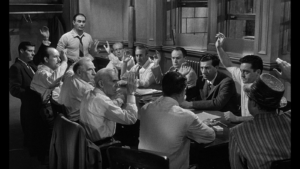Performance of ‘Twelve Angry Men’ at Pontifical Irish College
Posted on 03. Mar, 2017 in Carousel
Members of the community of the Pontifical Irish College, Rome, performed Reginald Rose’s play, Twelve Angry Men, directed by Joseph Keegan, at the College on St Patrick’s Day, Friday 17th March and Saturday 18th March 2017.
The play is a courtroom drama about a jury that must reach a consensus on the basis of reasonable doubt, and the dynamics that unfold among the members as their deliberations proceed.
For photographs from the performance, click here.
Here is a reflection, written by Fr Colin Rothery:
Twelve Angry Men, St. Patrick and welcoming the Other as Gift
Reginald Rose’s play seems more relevant than ever, 60+ years after its publication. It has a lot to say to our world, full (as it always has been) of emmigrants and immigrants moving in search of a decent life free of danger, immigrants who may meet prejudice or openness. The Gospel brings a message of hope for the outsider, the accused, the prisoner (guilty or innocent), the one who is different, the outcast, the one on the other side of the wall. As Pope Francis put it in his Lenten message of 2014, ”Love makes us similar, it creates equality, it breaks down walls and eliminates distances.”
Christ brings hope of reconciliation when the distance between us seems unbridgeable, because he understands us from the inside, beyond our accents, our customs and our national blindspots. When a violent crime is committed, we know the hurt that’s caused, but do we ask what series of events lead to it, what sense of hopelessness or anger helped to push him or her to do what we ourselves might do were it not for God’s grace? As the 12 jurors talk, argue and shout, they (and we with them) come to understand that ‘everyone has a breaking point’. ”How many people no longer see meaning in life or prospects for the future, how many have lost hope! And how many are plunged into this destitution by unjust social conditions, by unemployment, which takes away their dignity as breadwinners, and by lack of equal access to education and health care.” (Pope Francis, Message for Lent, 2014). In Rose’s play, a young man from such a background is in danger of a death sentence. But is he guilty or innocent? Does he (or anyone) deserve a death sentence?
Christ knows what it means to have your life hang in the balance of other mens’ judgement. In a way, He is the immigrant personified, leaving the bosom of the Father in the incarnation, and putting himself in the position that the immigrant will always have: the end of the queue, the weakest, the one who is sometimes feared and sometimes driven out. He challenged his people to try to see the Samaritan and the pagan no longer as ”one of them”, but as a child of God. And He challenges us to go do the same.
St. Patrick lived among the Irish as a foreigner. No doubt he saw the good and the not so good side of the Irish, and who knows whether as a missionary bishop travelling around the country with a strange religion from another country, he heard someone shout from time to time, ”Go back to your own country! We have our own Gods! ” ? In our world, the temptation to look after ourselves first and others after, whether at an individual, local, national or even a faith level, continues and is even being encouraged in some quarters. But Christ has a different way. In his message for Lent 2017, Pope Francis speaks of the importance for Christians of seeing the other as gift, not as a threat.
One of jurors in 12 Angry Men expresses his fear of the other in these terms, ”they are different. They think different. They act different”, and while in a way that can be true, Rose’s play invites us to look below the surface, to do what Christ did: ”come and walk a mile in my shoes”. To try to understand where are differences come from, and more importantly what binds us together in the one humanity taken by Christ. ”12 Angry Men” makes a passionate (and very entertaining) plea to work for what Pope Francis calls ”the culture of encounter in our one human family.” (Lenten Message 2017).Fr. Colin Rothery

